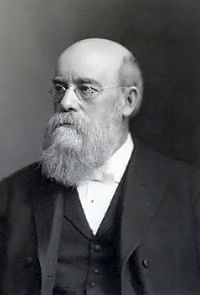Washington Gladden was a prominent minister, local politician and social reformer in late-nineteenth-century and early-twentieth-century Ohio.
Gladden was born in 1836 in Pennsylvania. He spent most of his youth in Owego, New York, before attending Williams College. Upon graduation, Gladden was ordained as a Congregational minister. He ministered to several churches in Massachusetts and New York, before becoming pastor of the First Congregational Church in Columbus, Ohio, in 1882. Under his leadership, this church’s congregation grew from 558 members in 1885 to 1,214 people by 1914.
Gladden was a firm believer in the social gospel. He believed that all Christians must dedicate themselves to the mission of Jesus Christ. They must fight corruption and greed. They must also do all in their power to help their fellow men and women. Numerous people during the late nineteenth and early twentieth centuries held these beliefs. They became known as Progressives, and Gladden was one of the most prominent ones in Ohio during the late 1800s and the early 1900s.
Upon arriving in Columbus, Gladden was shocked by the corrupt government officials and flagrant disregard for law and order. Especially distressing for Gladden was the local government’s failure to enforce a law requiring saloons to remain closed on Sundays. He firmly believed that people should spend Sundays celebrating God and not drinking. To improve the community, Gladden won election to the Columbus City Council. He served from 1900 to 1902. While he had hoped to instill moral values in government officials as well as local residents, Gladden was consumed with more mundane issues. He helped secure reduced streetcar fares. He also helped Columbus assume control over a local electric plant. He, however, was unable to enact temperance laws, to enforce Sunday blue laws, and to assist laborers in obtaining better working conditions. Gladden chose not to run for reelection after his term in office.
Gladden remained active in public life following his time as a councilman. He encouraged his parishioners to become active in their community and to put pressure on politicians to follow the will of the people instead of just the desires of wealthy industrialists. He lobbied his followers to battle selfishness in themselves and in others. Unfortunately, like most followers of the Progressive Movement, Gladden was intolerant of others. He called for equal rights and opportunities for African Americans with white people, but at the same time, he believed that blacks were naturally inferior to whites. Gladden also believed immigrants, especially Catholic immigrants, were lazy and prone to alcoholism. At the same time, it is important to remember that Gladden and most other Progressives, despite some major shortcomings, sought to improve life in the United States by ending the greed of business owners, eradicating corruption in government, and by assisting their fellow men and women. Gladden died in 1918.



